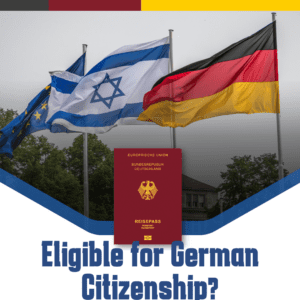Who Is Eligible for German Citizenship? (✔️ Updated Guide 2024)
The reform in German citizenship law allows many descendants of Jewish German citizens and victims of Nazi persecution to be eligible for German citizenship.
What’s important to know about the expanded eligibility for German citizenship since August 2021? Do children and grandchildren of German citizens also qualify for German citizenship and a German passport? How long does the citizenship process take, and who is not eligible for German citizenship? Check out our guide for all the important answers:
Expanded Eligibility for German Citizenship Since August 2021
In August 2021, eligibility for German citizenship was expanded, making it easier for many Israelis to obtain the coveted European citizenship.
Granting Citizenship to Nazi Victims and German Residents
After the reform in German citizenship law, many descendants of German citizens who were not previously eligible now also qualify for German citizenship.
Descendants of residents of Germany between the years 1933-1945, who were forced to flee from the Nazi regime, are also eligible for German citizenship.
Citizenship for Descendants Without Generational Limits
Not only children of German citizens or residents are eligible for German citizenship, but also their descendants without generational limits. Even if the parents themselves did not exercise their citizenship, descendants can request German citizenship. This includes grandchildren of Holocaust survivors whose parents and grandparents were not German citizens or residents.
Abolishment of Gender-Based Discrimination
In the past, there was gender-based discrimination between descendants of male German citizens and female German citizens, which prevented those born to German mothers but foreign fathers before April 1953 from obtaining German citizenship. Today, gender-based discrimination has been abolished, regardless of whether it is the mother, father, grandmother, or grandfather; their descendants are eligible for German citizenship.
Cancellation of Language and Culture Tests
After the amendment to the law, descendants of German citizens and Nazi victims are not required to pass German language and culture tests.

The Process of Obtaining German Citizenship
The general process of obtaining German citizenship includes locating relevant documents, such as documents proving the family connection to a German citizen or a persecuted permanent resident, birth certificates, name change certificates, criminal records, and more.
After locating the documents, you will need to fill out an application form to prove your identity. After receiving the initial approval, you must attach all the original documents, translated into German with a notary stamp, and submit them to the German citizenship department. Then, you’ll wait for the documents to be reviewed and receive your German citizenship.
Once the documents have been accepted, the submission of a German citizenship application for those who have proven their eligibility is started. After submitting the application and documents, and as long as there are no necessary corrections to the application or additional documents to be submitted, the request will be forwarded to the immigration authorities in Cologne, Germany, responsible for processing naturalization requests from outside Germany.
Officials from the department will examine whether the application meets the requirements of German citizenship law and will decide whether to approve or reject the application.
To ensure a smooth application process and maximize your chances, it is recommended to seek assistance from an experienced attorney who understands the German bureaucracy and knows which documents require notarized translations into German or apostilles.
How Long Does the Citizenship Process Take?
Due to the expanded eligibility for German citizenship, the increased number of citizenship applicants, and the meticulous processing by German authorities, the duration of the citizenship process has extended. Nowadays, the process of obtaining German citizenship is expected to take an average of two to three years from the moment the application is submitted, including all supporting documents.
It’s important to note that the duration of the citizenship process varies from person to person based on individual circumstances and the documents submitted with the application.
Documents Required to Prove Eligibility for German Citizenship
Firstly, you must ensure that you possess documents that prove the former German citizenship of family members on whose basis the application will be grounded. Such documents may include:
- Their old passport
- Confirmation of studies from an accredited German institution
- Certificates proving the acquisition of a profession in Germany
- Business management documents from Germany
- Marriage certificates from Germany
In contrast, birth certificates alone may not be sufficient, as they do not establish citizenship or permanent residency. However, being born in Germany may serve as a prior indication of eligibility for citizenship, so it is advisable to search for additional relevant documents if you have a birth certificate.
If you do not possess documents like the ones mentioned above, either because the persecuted individuals on whose basis the application is submitted are no longer alive or because they were unable to keep such documents when they left Germany, you can still locate documents that can serve as evidence through various means. One of these methods is conducting a search in German archives.
Our office provides this service as part of the comprehensive range of services offered in the context of representing German citizenship applications.
After obtaining the documents that serve as evidence of eligibility, you will need to establish the family relationship between the applicant and the persecuted individual using official documents. This is done to ensure and clearly demonstrate that a blood relationship exists between the two parties. Establishing this relationship is done by obtaining documents such as marriage certificates of parents or grandparents, birth certificates, and registration summaries, all according to the list of documents requested by the German authorities.
Do you have to surrender your citizenship to obtain a German passport?
One of the common questions our office receives since the legislative update is whether individuals must renounce their current citizenship when acquiring German citizenship. In most cases, the answer is that renunciation is not required.
While Germany has historically had a strict policy regarding dual citizenship, this policy has softened over time, particularly in regard to Israeli citizens. Currently, there is no prohibition against holding both German and Israeli citizenship.
However, it’s important to note that those who wish to acquire additional citizenship after obtaining German citizenship, such as American citizenship (for those who qualify), may encounter difficulties. In such cases, German authorities may encourage renunciation of German citizenship. Given the potential challenges in these situations, it is advisable to consult with an attorney who specializes in immigration law.
How Much Does It Cost to Obtain German Citizenship?
Many individuals wonder about the cost of processing German citizenship applications. It’s important to note that the cost may vary depending on the extent of processing required for the applications and the number of applicants submitting the request. Therefore, there is no fixed cost, and the final price will depend on these factors.
Firstly, there is a difference between the cost of processing a single application and the cost of processing a number of joint applications within the same family.
Conducting archival research to locate evidence of eligibility will incur an additional fee.
Additional fees may be added for various documents required by German authorities. For example, as of 2023, the fee for submitting an application for a flexible passport ranges between 60-100 euros for a single application (i.e., for each individual citizenship holder). On the other hand, currently, submitting an application for citizenship and receiving a naturalization certificate is not subject to a fee payable to German authorities.
Appointment at the German Embassy
A significant part of the process of obtaining a German passport after becoming a German citizen is waiting for an available appointment at the German Embassy. You should contact the embassy, schedule an appointment, and prepare the necessary documents accordingly.
Generally, scheduling appointments at the German Embassy in Tel Aviv is done through an online appointment booking system operated by the embassy itself. Due to the high demand for passport applications, it may be challenging to secure appointments at the embassy. In many cases, the system is updated with new appointment slots during nighttime hours.
Patience is essential, and by the end of the day, everyone will have the opportunity to schedule an appointment.
Are Children of German Citizens Eligible for German Citizenship?
Yes, children of German citizens, including adopted children, are also eligible for German citizenship. According to German citizenship law, descendants of German citizens and residents who were persecuted by the Nazis between 1933 and 1945 are entitled to German citizenship.
Eligibility of Spouses for German Citizenship
While German citizenship is automatically passed on to family members (children, grandchildren, great-grandchildren, etc.), it is a bit more complicated for spouses of German citizens. Couples in which one of the partners holds German citizenship can relocate to European Union countries and live together based on a family reunification process.
German law stipulates that after three years of legal residence in Germany, couples can apply for German citizenship. A significant condition for this is that the couple must be married or in a registered partnership recognized in Germany (a relationship status similar to common-law marriage in Israel) at the time of submitting the application.
It’s important to note that the same conditions can apply to same-sex couples. Additionally, the requirements for obtaining citizenship through this process may be stricter and may include language proficiency and other criteria.
Eligibility of Grandchildren for German Citizenship
It’s important to know that grandchildren of Holocaust survivors in Germany can also apply for and obtain German citizenship and a German passport, even if their parents are not German citizens. In other words, it’s possible to skip a generation when applying for German citizenship. The conditions for grandchildren are similar to those for the children of Holocaust survivors (first-generation descendants).
In general, we recommend that family members apply for citizenship jointly rather than separately. German law allows all family members to apply for citizenship together in a single application. This can be highly beneficial in terms of streamlining the process and reducing the overall costs associated with the application.
Does Military Service Cause Loss of German Citizenship?
Individuals who served voluntarily in the military, including the Israel Defense Forces (IDF), between 2000 and 2010 may have lost their German citizenship. However, starting from 2011, serving in the IDF or other foreign military service no longer results in the loss of German citizenship.
Those who lost their citizenship due to military service in the IDF may be eligible to reacquire German citizenship under certain circumstances.
מאמרים מומלצים



